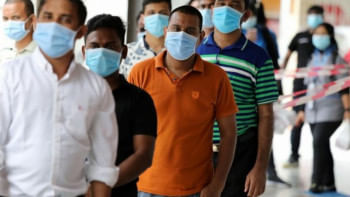Vital yet vulnerable

Iqbal of Cumilla sadar sustained a severe spinal injury after falling from a two-storey construction site in Bahrain. He was taken to the hospital and provided with emergency care. After 10 days, he was sent back home, his critical injury hardly treated. Though Iqbal had insurance coverage and his employer had promised to bear all his expenses, he has not received a penny in the last three years since he has been back. With his dream shattered, Iqbal is now a burden on his family.
After enduring a lot of abuse at the hands of her Saudi employer, domestic worker Meher Nigar (of Birganj, Dinajpur) became very ill and was admitted to hospital. However, instead of continuing with the treatment, without any prior consultation she was put on a flight back home, for which she was made to pay from her savings.
For the sake of her children's future, Zakia (of Savar) endured wage theft and abusive work conditions for more than a year. Her Saudi employer refused to take any action when she reported that there was a lump in her breast causing pain. When her condition aggravated, Zakia's employer transferred her to the placement agency. She was finally sent back home only after her family arranged to pay for her return air ticket.
Though Imdad (of Natore) was placed in construction instead of pipe-fitting work, his six-year stint in Qatar was largely successful. One day, he was apprehended by the authorities along with two other undocumented migrants. A migrant with regular status, Imdad demanded the reason for his detention only to suffer severe assault by members of the law enforcement agency. He was in severe pain and was subsequently taken into custody. Initially, he was denied any treatment, but when other detainees intervened, he was taken to a medical facility and a plaster was put on his broken leg. Within days, Imdad was deported home. His mobile phone was confiscated by the authorities. He was not even allowed to contact his employer to claim his outstanding benefits and other entitlements.
The Gulf states' shift to mandatory private health insurance for all, including low-paid workers, has created fresh hurdles to healthcare access. The non-citizens are no longer eligible for free non-emergency care and require private health insurance or government-issued health cards to access healthcare in government hospitals and private clinics. Often, employers fail to adhere to the contract and buy or renew insurance for the workers. In instances in which they do so, those are not of quality and have limited acceptance, and thus do not cover the workers' needs. "Good insurance isn't cheap and cheap insurance isn't good," as the saying goes.
The above narratives collected from the returnee Bangladeshi migrants by the Refugee and Migratory Movements Research Unit (RMMRU) provide important insights on their health vulnerability in destination countries, including those in the Gulf. The case studies also shine a light on the gaping holes in the migrant protection and service structures of those countries.
Over the last two years, a five-country Vital Signs study has garnered important evidence and insights about the health vulnerability of low-skilled migrant workers who are subjected to a wide range of cumulative risks to their physical and mental health. The study finds that those risks originate from their workplace, living conditions and the environment, and include heat and humidity, pollution, abusive working conditions, excessive working hours and heavy physical workloads, lax occupational health and safety (OHS) practices, exposure to long-term chronic psychosocial stress, and, in the case of female domestic workers, acute vulnerability to physical, psychological and sexual abuse.
RMMRU findings in Bangladesh bring to the fore the challenges that migrant workers face during their medical check-up during the pre-departure phase. Included among those are high costs for a limited number of tests, monopoly of several dozens of diagnostic centres, wrong diagnostic reports, lack of health-related information during pre-departure orientation training, lack of knowledge of healthcare entitlements, vague terms on health issues in contract documents, etc.
The Vital Signs report informs that "the GCC states' healthcare services are generally not tailored to the specific needs of this population." The major obstacles that low-skilled workers face in accessing healthcare services are the lack of documentation and affordability. The practice of confiscating passports by employers works as a major impediment for those who are fortunate to qualify for healthcare services. Employers failing to issue or renew work permits and health cards also work as barriers. Though emergency healthcare is provided free of charge to all, the undocumented workers refrain from accessing it even under life-threatening conditions as the medical staff are required to report such cases to the authorities. Low-paid workers face major hurdles in accessing non-emergency healthcare services. In such a scenario, untreated preventable conditions often aggravate into serious life-threatening conditions. Domestic workers endure distinct barriers. Restriction on their mobility contributes to their inability to independently leave their employers' houses to see a doctor when they are ill, or even to procure basic medicine and sanitary supplies.
The Gulf states' shift to mandatory private health insurance for all, including low-paid workers, has created fresh hurdles to healthcare access. The non-citizens are no longer eligible for free non-emergency care and require private health insurance or government-issued health cards to access healthcare in government hospitals and private clinics. Often, employers fail to adhere to the contract and buy or renew insurance for the workers. In instances in which they do so, those are not of quality and have limited acceptance, and thus do not cover the workers' needs. "Good insurance isn't cheap and cheap insurance isn't good," as the saying goes.
The migrants' informal access to healthcare services has been further restricted by the introduction of modern technology to record and monitor patients' treatment and conduct surveillance over medical facilities. Pervasive use of technology has further eroded the little scope that existed earlier for compassionate staff members of such facilities who even conducted tests and procedures on patients who were otherwise not entitled to secure such services.
Near absence of an affordable and accessible healthcare arrangement in the Gulf states has led many workers to rely on self-medication, often consuming expired medicines brought from home by themselves and their peers. Health professionals warn that rampant and non-prescribed use of painkillers, antibiotics and other medicines exacerbates the workers' conditions, rather than bring them relief.
The paradoxical grim scenario of unmet healthcare needs of low-skilled migrants speaks volume about the neglect of this fundamental right by the Gulf states, most of which take pride in being able to put in place "world-class medical services" for their own nationals. It is time those states paid due attention to the healthcare needs of the millions of workers who ceaselessly contribute to turning the wheels of their economies.
The authorities in the Gulf states must institute meaningful measures to meet the necessary healthcare needs of low-paid migrant workers free of charge at the point of care, irrespective of their immigration status or their possession of passports. They must also repeal any law that requires medical professionals to report undocumented migrant workers to the authorities. Provisions are to be in place for the employers to ensure hygienic living conditions and safe working conditions. The employers must also be obliged to ensure adequate shade and drinking water, and allow workers to take regular breaks – particularly those working outdoors. Likewise, mandatory and regular health check-ups for domestic workers should be introduced.
Largely driven by the urge to harness higher volume of remittances, the origin countries have thus far mostly focused on measures to send increased numbers of workers abroad. Policy and institutional measures are also afoot to raise awareness among the migrant workers, improve their skills, and help them access justice. There has been an active engagement of civil society organisations (CSOs), development partners, and international organisations (IOs) in all such initiatives in Bangladesh. However, the issue of heath needs of low-skilled migrant workers is yet to find meaningful space in the policy agenda of the government or in the programme agenda of CSOs, development partners, and the IOs.
As a country that is highly reliant on remittance flow, Bangladesh should actively engage with this unmet vital need of its migrant workforce. The authorities here should form a task force of stakeholders including public health experts to examine the healthcare needs of this cohort of workers. The task force's recommendations should be the basis for framing transparent and explicit healthcare provisions of all bilateral agreements and MoUs with labour-receiving states. At the multilateral level, Bangladesh should work in coalition with other origin states and outline a detailed position aimed at improving migrant access to healthcare in regional and global forums.
At a recent RMMRU seminar on healthcare needs of Bangladeshi migrants, a Dhaka Medical College Hospital (DMCH) nephrologist shared that the wives of migrant workers often approach DMCH doctors to speak with their migrant husbands overseas over phone to hear the symptoms and prescribe medicines so that they could send such medicines with someone going there. He said for some migrants, medical centres were at distances they could not access; others lacked documents or simply could not afford the services and medicines. Would the authorities take into cognisance such lived reality of our migrant force and begin to work out measures to address their needs?
The author acknowledges the support of RMMRU colleagues Md Shimonuzzaman, Rukaia Parveen Tuba, and Rajib Ghush for collecting and developing the case studies.
Dr CR Abrar is an academic and the executive director of Refugee and Migratory Movements Research Unit (RMMRU).

 For all latest news, follow The Daily Star's Google News channel.
For all latest news, follow The Daily Star's Google News channel. 










Comments